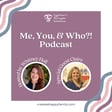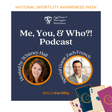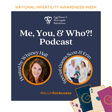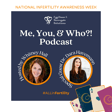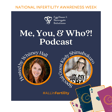
S3E7 Who?! Navigating Fertility Challenges with Dr. Jerald Goldstein
Summary
In this insightful episode, Dr. Jerald Goldstein discusses his path to becoming a reproductive endocrinologist and the emotional and scientific aspects of fertility treatments. He shares his perspectives on the evolving landscape of reproductive technology, the vital role of egg donation and surrogacy in family building, and addresses common misconceptions about the process. Throughout the conversation, Dr. Goldstein emphasizes the importance of patient education, support, and resilience in facing fertility challenges. He offers practical advice for intended parents and donors, stressing the value of trusted guidance and the strength to persevere. The episode concludes with heartwarming reflections on the joy of witnessing successful pregnancies and the deep fulfillment of helping families come to life.
Takeaways
-Dr. Goldstein's journey into medicine was driven by a fascination with pregnancy.
-Reproductive endocrinology combines various aspects of medicine, including surgery and psychology.
-The emotional landscape of fertility treatments is complex and requires sensitivity.
-Providing information helps alleviate anxiety for patients facing infertility.
-The evolution of reproductive technology has significantly improved success rates.
-Surrogacy and egg donation have become more mainstream and accessible.
-Common misconceptions about third-party reproduction often stem from societal stigma.
-Intended parents should seek multiple opinions and find a supportive clinic.
-The joy of hearing a baby's heartbeat during the first OB scan is unparalleled.
-Fertility Specialists of Texas prioritizes patient care and has a strong support team.
Links
